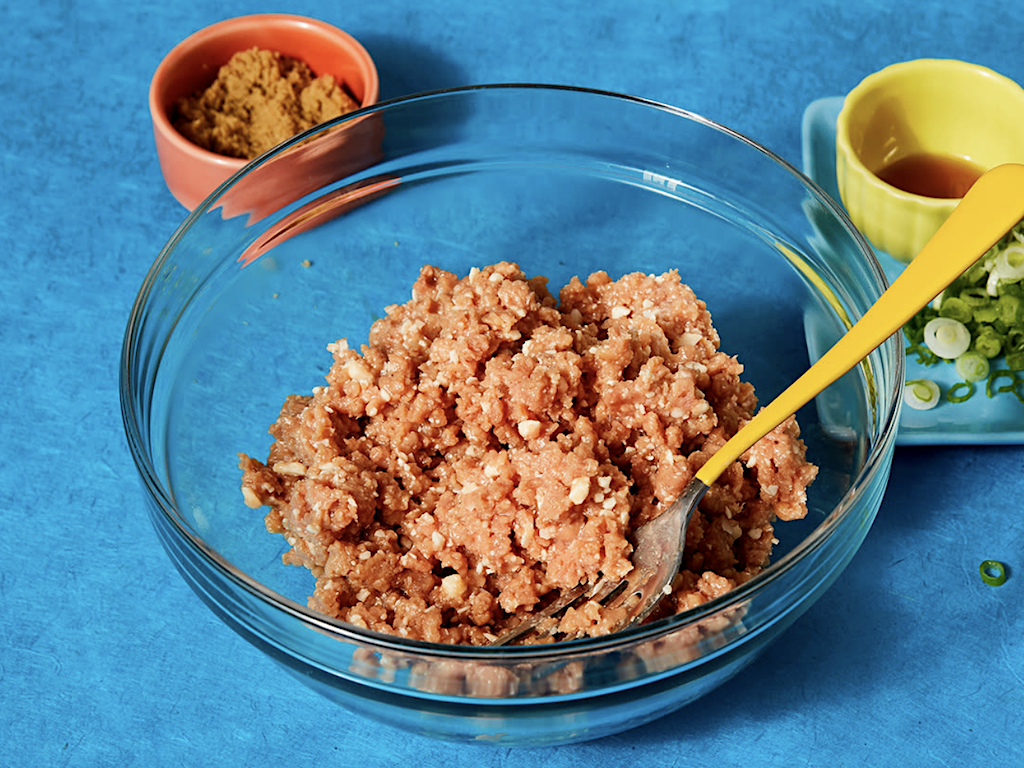4 Mins Read
Silicon Valley food tech Impossible Foods’ plant-based pork has just been named one of the best inventions of the year on Time Magazine’s prestigious annual list. Impossible Pork debuted earlier this year at a major tech trade show held in Las Vegas and made the list because the “favorable environmental impacts of a pork alternative are clear”.
Impossible Foods has been recognised on Time Magazine’s “100 Best Inventions of 2020” list for its plant-based pork analogue that is “said to taste uncannily like the real deal”. Featuring alongside the Air Vodka and The Greater Good Fresh Brewing Co Pinter within the food and drink category this year, Impossible Pork was first introduced to the world in January at the Consumer Electronics Show (CES), and like the food tech’s flagship plant-based burger patties, contains soy protein and plant-based heme – the iron molecule derived from genetically-modified (GMO) yeast that gives Impossible’s products their iconic meaty look and flavour.
In the announcement, Time Magazine’s editorial producer Nadia Suleman wrote: “The world’s most- consumed animal protein is pork — and its farming results in a slew of environmental issues, including pollution due to swine waste. Impossible Foods, which wowed the world with its rendition of a burger in 2015, aims to tackle these issues with a plant-based pork substitute, Impossible Pork.”
Perfect Day, the food tech that has developed animal-free dairy milk without cows using fermentation technology, has also been recognised on the list as a “Special Mention”. Time Magazine says the company and its “flora-made” dairy milk proteins, which is now backed by former CEO and current chairman of Disney Robert Iger and stands as the most well-funded protein fermentation company in the world to date thanks to its US$300 Series C, should be acknowledged for its invention that has enabled the creation of ice-cream that is “so creamy and flavorful that you can barely tell that it’s animal-free.”

The world’s most- consumed animal protein is pork — and its farming results in a slew of environmental issues, including pollution due to swine waste.
Nadia Suleman, Editorial Producer, Time Magazine
Candidates for the best inventions go through an evaluation of multiple factors, including originality, effectiveness, ambition and impact. Though plans for Impossible Pork’s commercial roll-out are “still in the works”, Suleman added that the food tech was commended on the official list because “favorable environmental impacts of a pork alternative are clear.”
Impossible’s pork alternative is aimed squarely at tackling the significant pork shortage within Asia, particularly in China where the African swine fever (ASF) outbreak wiped out at least half of the country’s pig herd. The initial preview of the product in January also came as a timely solution to the rising awareness over the dangers and vulnerabilities in the broader meat supply chain, which saw widespread disruption amid the coronavirus pandemic over the course of this year.
The Silicon Valley plant meat startup has made its intentions to target the Asian region and specifically the Chinese market clear in recent weeks. In October, Impossible made its official entry into the retail market in Asia, launching its Impossible Beef product across nearly 200 grocery locations across Hong Kong and Singapore, which came on the heels of its Asia-first debut of its Impossible Sausage product and citywide partnership with Starbucks Hong Kong and collaborating restaurants.
China is the fastest growing meat consumption market in the world, and the demand for meat in the country creates a food security issue because there is not enough agricultural land to meet the demand.
Patrick Brown, Founder & CEO, Impossible Foods

In an exclusive virtual media conference featuring the food tech’s senior executives attended by Green Queen, CEO and founder Patrick Brown was clear that while regulatory procedures to launch in mainland China have yet to be completed, it’s ambitions for the market are clear.
“We want to launch in mainland China and build an entire production ecosystem in China as soon as we possibly can,” Brown told reporters. “China is the fastest growing meat consumption market in the world, and the demand for meat in the country creates a food security issue because there is not enough agricultural land to meet the demand.”
But it’s Asia-focused expansion hasn’t meant any deceleration within its domestic U.S. market either, where it has landed on the shelves of the country’s biggest retailer Walmart in the midst of the pandemic. And according to the company, 92% of sales of its famous bleeding plant-based Impossible Burger is directly displacing animal-derived meats from consumers who are increasingly shifting away from all meat categories this year.
Beyond creating alternatives for pork and beef, the company has further revealed that it has plans to develop plant-based analogues for other animal-based foods, including milk. Having raised US$1.5 billion since its inception in 2011, including two impressive Series F and Series G rounds amid a pandemic this year totalling US$700 million, the food tech says it will set aside a significant portion of its funds to expand its R&D team and technology platform to meet this goal.
All images courtesy of Impossible Foods.




